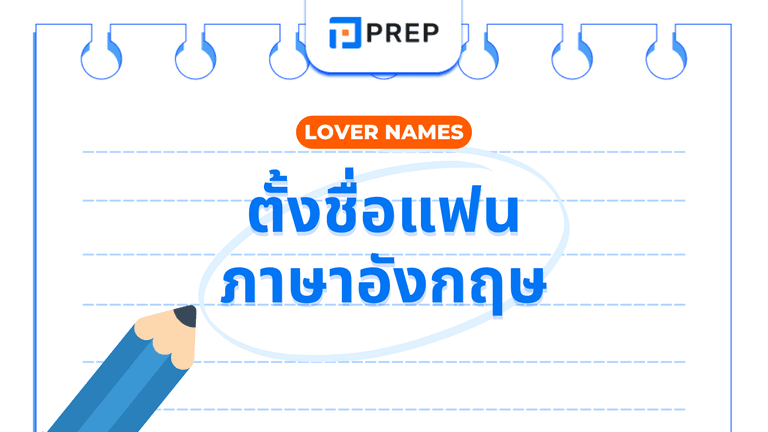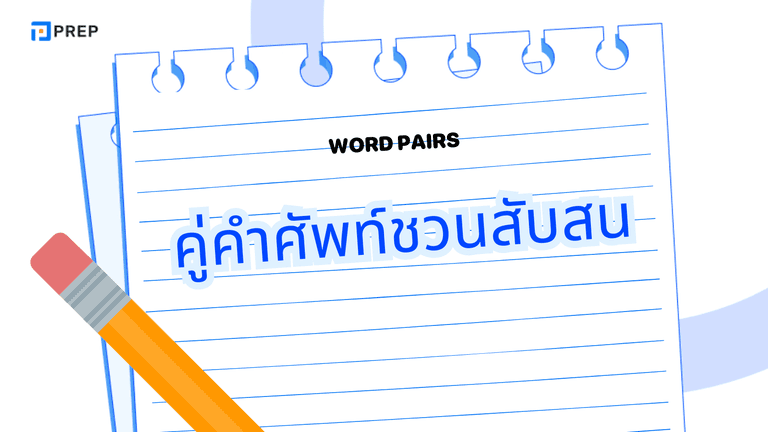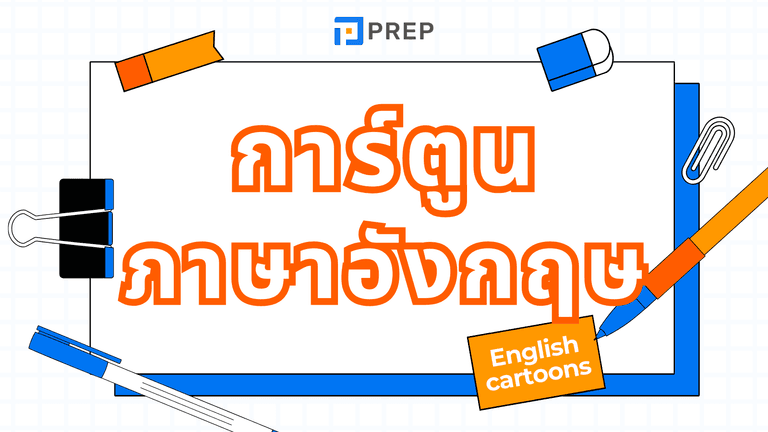สรุปการใช้ Relative adverbs (where, when, why) พร้อมตัวอย่างเข้าใจง่าย
Relative Adverbs ในภาษาอังกฤษเป็นหนึ่งในหัวข้อไวยากรณ์ภาษาอังกฤษที่สำคัญที่สุด แล้วมี relative adverbs ที่ใช้บ่อยในภาษาอังกฤษกี่คำกันนะ โครงสร้างเป็นอย่างไร และใช้ยังไงได้บ้าง ในบทความนี้ PREP จะช่วยให้คุณเข้าใจได้ดียิ่งขึ้น!

I. Relative Adverbs ในภาษาอังกฤษคืออะไร
Relative adverbs ในภาษาอังกฤษใช้เพื่อแสดงความสัมพันธ์หรือการเชื่อมโยงระหว่างส่วนต่าง ๆ ของประโยค ช่วยให้แสดงความสัมพันธ์เกี่ยวกับเวลา สถานที่ จำนวน เหตุผล ลักษณะ เงื่อนไข วัตถุประสงค์ และการเปรียบเทียบภายในประโยค
Relative adverbs ที่ใช้บ่อยมีสามคำ ได้แก่ When, Where และ Why ด้านล่างนี้คือบางตัวอย่างของ relative adverb:
-
I always remember the time when I lived with my grandparents. - ฉันจำได้เสมอถึงเวลาที่ฉันเคยอยู่กับปู่ย่า
-
Do you know the street where a famous restaurant is located? - คุณรู้จักถนนที่มีร้านอาหารชื่อดังอยู่ไหม?
-
I really don’t know the reason why you chose that option. - ฉันไม่รู้จริง ๆ ว่าทำไมคุณถึงเลือกตัวเลือกนั้น

II. การใช้และโครงสร้างของ Relative Adverbs ในภาษาอังกฤษ
ด้านล่างนี้คือการวิเคราะห์การใช้และโครงสร้างของ Relative Adverbs ในภาษาอังกฤษที่ PREP จัดทำขึ้นเพื่อให้คุณใช้ได้อย่างแม่นยำที่สุด
1. When
When ใช้เพื่อแสดงเวลาในประโยค โดยระบุถึงเวลาที่เหตุการณ์เกิดขึ้นหรือตั้งขึ้น ด้านล่างนี้เป็นคำอธิบายเกี่ยวกับการใช้ "when" และวิธีการนำไปใช้ ที่ PREP อยากแนะนำให้คุณศึกษา:
-
Gone are the days when I could stay up all night to study. - วันเวลาที่ฉันสามารถนอนดึกเพื่อเรียนได้หายไปแล้ว
-
I always remember the time when I lived with my grandparents. - ฉันจำได้เสมอถึงเวลาที่ฉันเคยอยู่กับปู่ย่า
2. Where
Where ใช้เพื่อระบุสถานที่ ตำแหน่ง หรือจุดภายในประโยค โดยช่วยให้ระบุตำแหน่งหรือสถานที่ที่เหตุการณ์เกิดขึ้น ด้านล่างนี้เป็นตัวอย่างการใช้และการนำ where ไปใช้ - กรุณาศึกษาอย่างละเอียด:
-
I will meet you at the park where we usually go for walks. - ฉันจะพบคุณที่สวนสาธารณะที่เรามักไปเดินเล่น
-
I love living in a city where there are so many cultural events. - ฉันชอบอยู่ในเมืองที่มีกิจกรรมทางวัฒนธรรมมากมาย
การใช้ where ใน Relative Adverbs ในภาษาอังกฤษมีโครงสร้างดังนี้: Relative clause + where + main clause
-
You can go to that supermarket where you can buy vegetables. - คุณสามารถไปซูเปอร์มาร์เก็ตที่คุณซื้อผักได้
-
Do you remember the restaurant where we had our first date? - เธอจำร้านอาหารที่เราเดทกันครั้งแรกได้ไหม

3. Why
Why ใช้เพื่อแสดงเหตุผลหรือสาเหตุภายในประโยค ช่วยอธิบายถึงเหตุผลที่เหตุการณ์นั้นเกิดขึ้น ด้านล่างนี้เป็นตัวอย่างการใช้และการนำ "why" ไปใช้:
-
She missed the train, and that’s why she arrived late. - เธอพลาดรถไฟ และนั่นคือเหตุผลที่เธอมาสาย
-
Her mass of library of books is the reason why she’s so well-spoken. - หอสมุดของเธอที่เต็มไปด้วยหนังสือเป็นเหตุผลที่เธอพูดเก่งมาก
III. หมายเหตุเกี่ยวกับ Relative Adverbs ในภาษาอังกฤษ
ต่อไปนี้เป็นข้อสำคัญที่ควรให้ความสนใจเมื่อเรียนรู้ Relative Adverbs ในภาษาอังกฤษ เพื่อหลีกเลี่ยงการใช้ผิดพลาดและไม่เสียคะแนนในข้อสอบ:
นอกเหนือจากโครงสร้างและการใช้งานที่ได้อธิบายไว้ข้างต้นแล้ว เรายังสามารถใช้ คำบุพบท/วลี + "which" เพื่อสร้างประโยคที่มีความหมายเทียบเท่ากับการใช้ relative adverbs อย่าง "when", "where" และ "why"
|
คำบุพบท/วลี + Which |
ตัวอย่าง |
|
In/at which = Where |
He showed me the house in which he grew up. = He showed me the house where he grew up. เขาพาฉันไปดูบ้านที่เขาเติบโตขึ้น |
|
On/in which = When |
I still remember the moment on which she won the championship. = I still remember the moment when she won the championship. ฉันยังคงจำช่วงเวลาที่เธอชนะการแข่งขันได้ |
|
The reason for which = Why |
She clarified the reasons for which she decided to change her career. = She clarified the reasons why she decided to change her career. เธอได้ชี้แจงเหตุผลที่เธอตัดสินใจเปลี่ยนเส้นทางอาชีพ |
บทความแนะนำ:
เจาะลึก Relative Pronouns เข้าใจง่ายใน 5 นาที
เข้าใจ Relative Clause ในไม่กี่นาที พร้อมตัวอย่างใช้งานจริง
เข้าใจ Relative Clause ในไม่กี่นาที พร้อมตัวอย่างใช้งานจริง
IV. แบบฝึกหัด Relative Adverbs พร้อมเฉลย
แบบฝึกหัดที่ 1: เลือกคำตอบที่ถูกต้อง
-
___ did you arrive at the airport last night?
-
When
-
Where
-
Why
-
-
Do you remember the restaurant ___ we had our first date?
-
When
-
Where
-
Why
-
-
___ did you choose that restaurant for dinner?
-
When
-
Where
-
Why
-
-
___ you finish your homework, we can go out with your friends
-
When
-
Where
-
Why
-
-
___ I was a child, I used to play soccer every day.
-
When
-
Where
-
Why
-
-
I will meet you at the park ___ we usually go for walks.
-
When
-
Where
-
Why
-
-
I was in high school ___ I first met my best friend
-
When
-
Where
-
Why
-
-
Can you tell me ___ you made that decision?
-
When
-
Where
-
Why
-
-
I will meet you at the café ___ we had our first date.
-
When
-
Where
-
Why
-
-
___ is she upset? What happened?
-
When
-
Where
-
Why
-
เฉลย:
-
A
-
B
-
C
-
A
-
A
-
B
-
A
-
C
-
B
-
C
แบบฝึกหัดที่ 2: เติมช่องว่างด้วยคำวิเศษณ์สัมพันธ์ที่เหมาะสม (where, when, why)
-
This is the restaurant __________ we had our first date.
-
Do you remember the day __________ we went to the beach?
-
Can you tell me the reason __________ she resigned from her job?
เฉลย:
-
This is the restaurant where we had our first date. ➡ "Where" is used to refer to a place or location. In this sentence, it introduces the location of the restaurant where the first date took place.
-
Do you remember the day when we went to the beach? ➡ "When" is used to refer to a specific point in time or an occasion. In this sentence, it introduces the time when the speaker and the listener went to the beach.
-
Can you tell me the reason why she resigned from her job? ➡ "Why" is used to introduce a reason or explanation. In this sentence, it introduces the reason for her resignation from her job.
การทำความเข้าใจการใช้ Relative adverbs ได้แก่ Where, When และ Why อย่างถูกต้องจะช่วยให้ผู้เรียนสามารถเชื่อมประโยคและให้ข้อมูลเพิ่มเติมเกี่ยวกับสถานที่ เวลา และเหตุผลได้อย่างชัดเจนและมีประสิทธิภาพในภาษาอังกฤษ Relative adverbs ใช้เพื่อเชื่อมประโยคโดยอ้างถึงคำนามที่เกี่ยวข้องกับสถานที่ เวลา หรือเหตุผล โดย Where ใช้กับคำนามที่เป็นสถานที่ เช่น "This is the place where we first met" (นี่คือสถานที่ที่เราพบกันครั้งแรก) When ใช้กับคำนามที่เป็นเวลา เช่น "I remember the day when we graduated" (ฉันจำวันที่เราจบการศึกษาได้) และ Why ใช้กับคำนาม "reason" เพื่อบอกเหตุผล เช่น "That's the reason why I was late" (นั่นคือเหตุผลที่ฉันมาสาย)
การเรียนรู้ว่า Relative adverbs สามารถใช้แทน Relative pronouns พร้อมคำบุพบทได้ เช่น Where = in/at which, When = on/at which, Why = for which จะช่วยให้ผู้เรียนเข้าใจความสัมพันธ์ระหว่างโครงสร้างทั้งสองได้ดีขึ้น นอกจากนี้ การเข้าใจว่า Relative adverbs สามารถใช้ใน Defining และ Non-defining clauses โดย Non-defining clauses ต้องมีเครื่องหมายจุลภาคคั่นยังเป็นสิ่งสำคัญที่จะช่วยให้การเขียนมีความถูกต้อง การฝึกฝนการใช้ Relative adverbs ในประโยคที่หลากหลายจะทำให้ผู้เรียนสามารถสร้างประโยคที่ซับซ้อนและเชื่อมโยงความคิดได้อย่างเป็นธรรมชาติ ซึ่งเป็นทักษะสำคัญในการเขียน IELTS Writing ที่ต้องการความหลากหลายของโครงสร้างประโยค
PREP Edu มอบเรียน IELTS ออนไลน์ที่ครอบคลุมการพัฒนาทักษะไวยากรณ์และโครงสร้างประโยคขั้นสูงอย่างเป็นระบบ ด้วยหลักสูตรที่แบ่งระดับตั้งแต่พื้นฐานจนถึงขั้นสูง ผู้เรียนจะได้รับการฝึกฝนผ่านบทเรียนที่มีโครงสร้างชัดเจนและครอบคลุม Relative clauses ที่สำคัญ เทคโนโลยี AI ช่วยประเมินและให้คำแนะนำแบบเฉพาะบุคคล ขณะที่ Virtual Writing Room ช่วยฝึกทักษะการเขียนและได้รับคำติชมทันทีตามเกณฑ์มาตรฐาน IELTS โดยเฉพาะเกณฑ์ Grammatical Range and Accuracy ทีมผู้สอนมืออาชีพพร้อมสนับสนุนเพื่อให้ผู้เรียนบรรลุเป้าหมายคะแนนที่ตั้งใจไว้อย่างมีประสิทธิภาพ

สวัสดีค่ะ ฉันชื่อมุก ปัจจุบันดูแลด้านเนื้อหาผลิตภัณฑ์ของ Prep Education ค่ะ
ด้วยประสบการณ์มากกว่า 5 ปีในการเรียน IELTS ออนไลน์ด้วยตนเอง ฉันเข้าใจดีถึงความท้าทายที่ผู้เรียนต้องเผชิญ แล้วก็รู้ว่าอะไรที่มันเวิร์ก
มุกอยากเอาประสบการณ์ตรงนี้มาช่วยแชร์ แล้วก็ซัพพอร์ตเพื่อน ๆ ให้ได้คะแนนที่ดีที่สุดค่ะ
ความคิดเห็น
เนื้อหาแบบพรีเมียม
ดูทั้งหมดบทความที่เกี่ยวข้อง
แผนการเรียนรู้ส่วนบุคคล
อ่านมากที่สุด
ติดต่อ Prep ผ่านโซเชียล
















